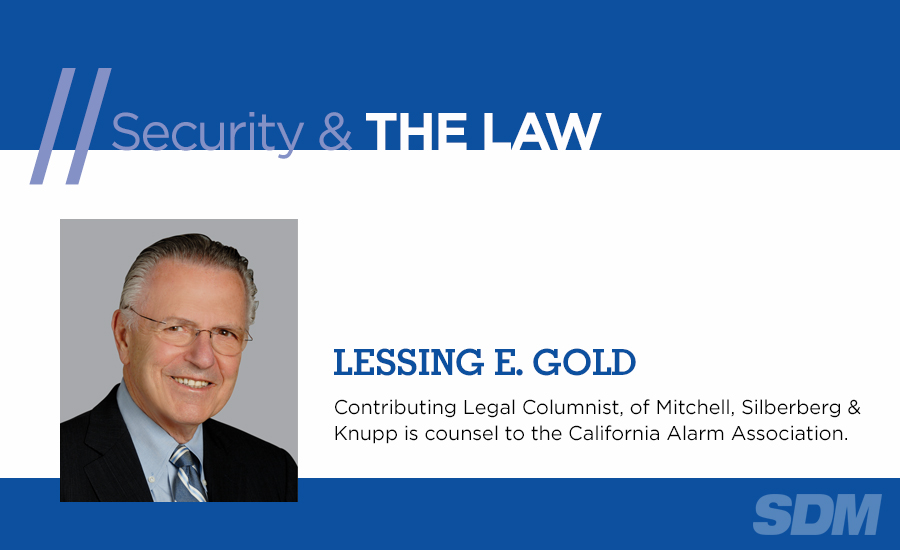Security & The Law
Does a City Need a License to Install Alarm Systems?
Security Licensing

This was an action by a city that installed and maintained alarm systems without a license, against the Illinois Department of Financial And Professional Regulation (IDFPR). The original hearing was held before the administrative law judge, who ruled in favor of the IDFPR.
Under the Private Detective, Private Alarm, Private Security, Fingerprint Vendor and Locksmith Act of 2004, private alarm contractor agencies and private alarm contractors must be licensed by the state. A private alarm contractor agency is defined as “a person, corporation or other entity that engages in the private alarm contracting business.” A private alarm contractor is defined as “a person who engages in a business that undertakes to sell, install, design, monitor, maintain, alter, repair, replace or service alarm and other security-related systems.”
The act mandates several character and fitness requirements for contractors, including training requirements, and further states that these regulations are for protection of the public; that the practices regulated “are declared to affect the public health, safety and welfare”; and that the act “shall be construed to carry out these purposes.”
The Illinois Municipal Code provides that among the corporate functions is the permission to establish and maintain for reasonable charges electrical appliances in public or private buildings for fire and police protection upon application of the custodian of public buildings, or of the owner of private buildings. Pursuant to this provision, the city contracts for the installation and monitoring of alarm systems to its residents for a fee. The city is not licensed as a private alarm contractor under the act, and the parties involved in the process, the head of the alarm department and the technician installing, maintaining and repairing alarm systems for the city, were not licensed.
The Administrative Law Judge (ALJ) rejected the plaintiff’s (the city) argument that the act’s licensing requirements did not apply to them and recommended that the plaintiffs be ordered to cease and desist from the unlicensed operation as a private alarm contractor agency and as private alarm contractors until such time as each had complied with the licensure requirements of the act. The city filed an action in the Circuit Court, who reversed the decision of the ALJ and ruled in favor of the city. The defendant, IDFPR, appealed. In its order, the Appellate Court concluded that the act did not apply to municipalities, citing the act’s repeated references to “private” entities and activities. The court determined that the plain language of the act suggests that the general assembly was contemplating the department’s regulation of private business activities when it drafted and passed the legislation. The court further held that if the act applied to municipalities, it would create a conflict with the code, which allows municipalities to operate alarm systems.
The best evidence of legislative intent is the language of the statute itself. When the language of a statute is clear and unambiguous, a court should not depart from the plain language of the statute by reading into it exceptions, limitations, or conditions that the legislature did not express.
Here, the language of the regulation is clear: The act applies only to private entities. The term “private” is not only present in the title of the act, but it is repeated consistently throughout the provisions. In light of the consistent definitions of the term “private” we find the plain and ordinary meaning is clear. The act is intended to regulate private individuals, corporations or other entities engaging in the business of selling, installing and maintain private alarm systems and other security related systems. In contrast, the act is not intended to regulate services offered by government entitles to the public.
The court found the plain language of the act indicates that it is not intended to regulate the conduct of the plaintiffs, a municipality and its employees. Accordingly the city is not subject to the act’s licensure requirements.
Perhaps the Illinois Legislature should amend the act to apply to municipal and state agencies as well as to private companies. Does this decision raise an issue of unfair competition?
Looking for a reprint of this article?
From high-res PDFs to custom plaques, order your copy today!






